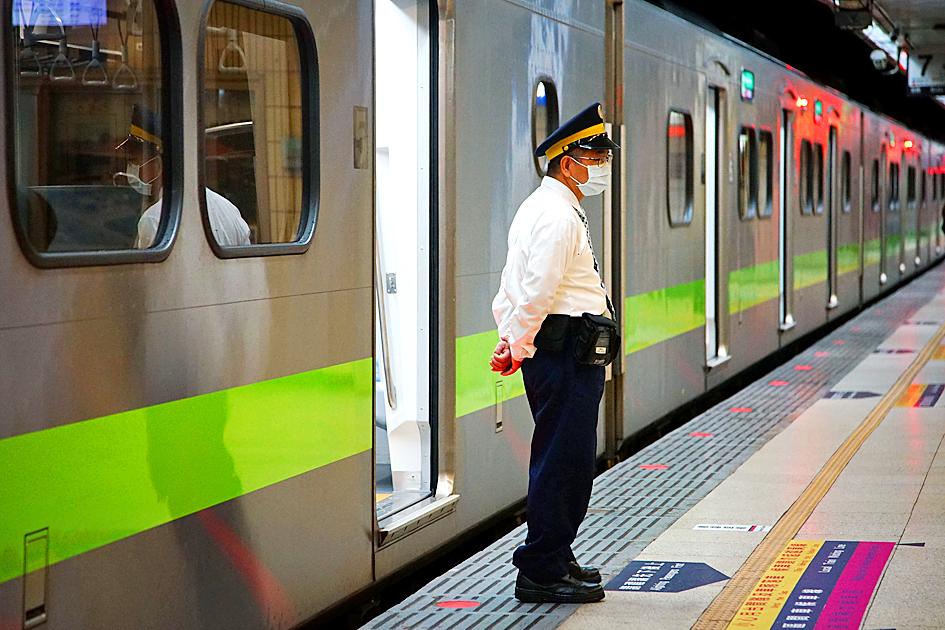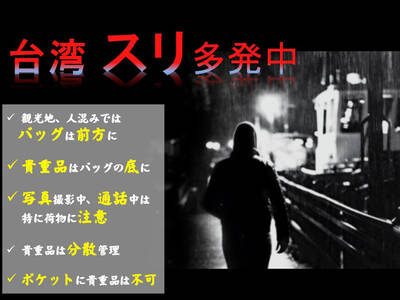A lack of higher salaries is the main reason that the Railway Bureau has been unable to recruit an adequate number of railway inspectors, Taiwan Transportation Safety Board Chairman Young Hong-tsu (楊宏智) said yesterday.
The bureau decided to hire railway inspectors to enhance safety following the derailments of Puyuma Express No. 6432 in 2018 and Taroko Express No. 408 last year, resulting in a total of 67 dead and 479 injured.
The responsibilities of a railway inspector are similar to those of an aviation inspector, to review all railway procedures, equipment and the train to ensure that everything complies with the safety regulations, the bureau said.

Photo: CNA
The railway inspectors would oversee the safety of not only the Taiwan Railways Administration’s railway network, but also the networks of the high-speed railway, the Taiwan Sugar Railway and the Alishan Forest Railway, the bureau said, adding that it has requested approval from the Executive Yuan to hire 42 railway inspectors.
Last year, it planned to hire 16 inspectors, but only 12 people took the job test, two of whom made it through the final recruitment round.
This year, the bureau plans to recruit 30 inspectors. While 41 people took the exam, eight secured a second-round interview. Even if all eight make it through the final phase, the bureau would not reach its goal.
The salaries offered to railway inspectors are not a strong enough incentive for people to apply, Young said.
“The Taiwan Railways Administration’s national network is about 1,200km of track. Higher salaries are crucial if the bureau wants to find qualified people to be inspectors. The bureau should convince the Directorate-General of Personnel Administration that the position is key to enhancing railway safety,” he said.
The monthly salary of a railway incident investigator with more than 10 years of experience is NT$100,000 or more, Young said, adding that he has requested that specialists working for the board receive reasonable salaries.
Railway Bureau Director-General Wu Sheng-yuan (伍勝園) said that the bureau proposed that the salaries of railway inspectors be comparable to those of specialists working at the Taiwan Transportation Safety Board, but the proposal was rejected by the Directorate-General of Personnel Administration.
The bureau has been offering assistant inspectors (those with at least four years of work experience) a starting salary of NT$56,061, while senior inspectors (at least six years of experience) are offered NT$63,218 and chief inspectors (at least 10 years) are offered NT$70,375.

The Japan-Taiwan Exchange Association has cautioned Japanese travelers to be vigilant against pickpockets at several popular tourist spots in Taiwan, including Taipei’s night markets, the Yongkang Street area, Zhongshan MRT Station, and Jiufen (九份) in New Taipei City. The advisory, titled “Recent Development of Concerns,” was posted on the association’s Web site under its safety and emergency report section. It urges travelers to keep backpacks fully zipped and carried in front, with valuables placed at the bottom of the bag. Visitors are advised to be especially mindful of their belongings when taking photos or speaking on the phone, avoid storing wallets and

ENDORSING TAIWAN: Honduran presidential candidate Nasry Afura said that Honduras was ‘100 times better off’ when it was allied with Taipei The Ministry of Foreign Affairs yesterday said it would explore the possibility of restoring diplomatic relations with Honduras based on the principle of maintaining national interests and dignity. The ministry made the remarks in response to reporters’ questions regarding an article titled: “Will Taiwan Regain a Diplomatic Ally?” published in The Diplomat on Saturday. The article said Honduras’ presidential election in November could offer Taiwan the chance to regain an ally, as multiple candidates have promoted re-establishing diplomatic relations with Taiwan. Honduras severed diplomatic ties with Taiwan in March 2023 in favor of Beijing, but since switching its diplomatic recognition,

A fourth public debate was held today about restarting the recently decommissioned Ma-anshan Nuclear Power Plant, ahead of a referendum on the controversial issue to be held in less than two weeks. A referendum on Aug. 23 is to ask voters if they agree that “the Ma-anshan Nuclear Power Plant should continue operations upon approval by the competent authority and confirmation that there are no safety concerns.” Anyone over 18 years of age can vote in the referendum. The vote comes just three months after its final reactor shut down, officially making Taiwan nuclear-free. Taiwan People’s Party Chairman Huang Kuo-chang (黃國昌) represented

Scoot announced yesterday that starting in October, it would increase flights between Taipei and Japan’s Narita airport and Hokkaido, and between Singapore and Taipei. The low-cost airline, a subsidiary of Singapore Airlines, also said it would launch flights to Chiang Rai in Thailand, Okinawa and Tokyo’s Haneda airport between December and March next year. Flights between Singapore and Chiang Rai would begin on Jan. 1, with five flights per week operated by an Embraer E190-E2 aircraft, Scoot said. Flights between Singapore and Okinawa would begin on Dec. 15, with three flights per week operated by Airbus A320 aircraft, the airline said. Services between Singapore